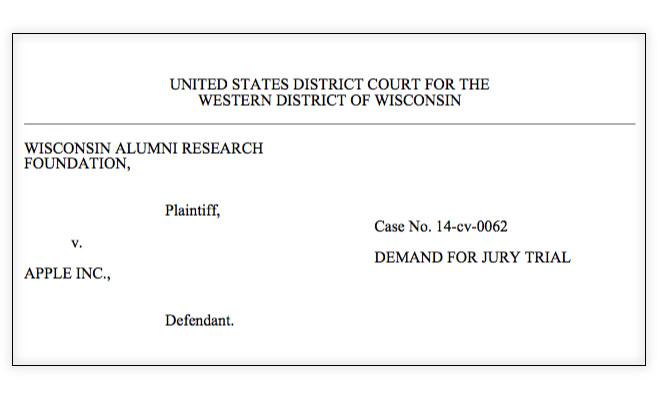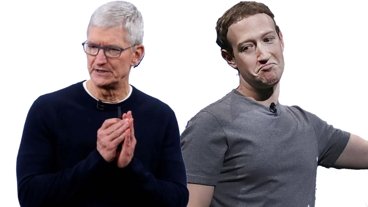The Wisconsin Alumni Research Foundation, the patent licensing arm of the University of Wisconsin, alleges in a newly-filed lawsuit that Apple's A7 processor infringes a university-developed patent that improves "the efficiency and performance of contemporary computer processors."
At issue is United States Patent No. 5,781,752 entitled "Table Based Data Speculation Circuit for Parallel Processing Computer." Computer scientists Andreas Moshovos, Scott Breach, Terani Vijaykumar, and Gurindar Sohi invented the technology while at the University of Wisconsin -Â Madison.
The patent's abstract details a process for allowing quicker execution of processor instructions:
A predictor circuit permits advanced execution of instructions depending for their data on previous instructions by predicting such dependencies based on previous mis-speculations detected at the final stages of processing.
According to the foundation's complaint, the researchers' work "has been recognized as a major milestone in the field of computer microprocessor architecture/design." Sohi, the group's leader, was given the Eckert-Mauchly Award — Â "the computer architecture community's most prestigious award" — for the work contained in the patent, the filing says.
Apple is accused of implementing the patent's technology in the company's new 64-bit A7 processor that powers the flagship iPhone 5s, iPad Air, and iPad mini with Retina display. The complaint alleges that Apple was aware of the patent's existence because it is cited in several newer patents issued to the Cupertino, Calif. company.
The lawsuit was necessary, the foundation alleges, because "Apple has stated that it is the policy of the company not to accept or consider proposals regarding licensing from outside entities like WARF for any purpose."
WARF is informed and believes, and on this basis alleges, that Apple has incorporated the technology of WARF's '752 patent into the A7 processor to achieve enhanced efficiency and performance. WARF now asks this Court to prevent Apple's unauthorized use of the '752 patent.
The foundation is seeking an injunction preventing Apple from continuing to use the technology without a license as well as monetary damages — Â including interest — Â and legal fees.
 Shane Cole
Shane Cole








 Wesley Hilliard
Wesley Hilliard
 Malcolm Owen
Malcolm Owen
 Andrew Orr
Andrew Orr
 William Gallagher
William Gallagher
 Sponsored Content
Sponsored Content
 Christine McKee
Christine McKee

 Thomas Sibilly
Thomas Sibilly






62 Comments
Is there any chance that there was parallel development of this technology?
Is there any chance that there was parallel development of this technology?
It wouldn't matter. If the University patented it first under those circumstances, they win. Apple either needs to either:
1. Show they didn't use the patent; or
2. Have the patent invalidated through prior art, non-uniqueness, etc.
[quote name="focher" url="/t/161873/apple-sued-by-university-of-wisconsin-over-a7-chip-at-heart-of-iphone-ipad#post_2466780"]It wouldn't matter. If the University patented it first under those circumstances, they win. Apple either needs to either: 1. Show they didn't use the patent; or [/Quote] This is the likely issue. There is so little published about A7 that you have to wonder if the university is making an assumption here. Honestly how would they know without some published information about the chip. It isn't like Apple attends Hot Chips and brags about their latest accomplishments. [Quote] 2. Have the patent invalidated through prior art, non-uniqueness, etc. [/quote] This is another possibility, P.A. Semi was in the low power world for a very very long time before being acquired by Apple. Who knows this patent might be based on stolen P.A. Semi tech. It wouldn't be the first time. This will be another one of those trails that in the end you really won't know who is right. This especially the case if tried by jury as there is no assurance of technical credibility in a jury trial. Beyond all of that I would imagine that there was an attempt at an agreement before this resulted in a legal action. If so Apple has already read the patent and declined to license the technology. In other words Apple believes it has a strong case that will stand up in court even with a jury trial. One more thing, this could be a fishing expedition by the professors involved to expose more information about Apple A7 series. It will be interesting to see what Apple and the courts do to protect Apples IP in this case.
Is there any chance that there was parallel development of this technology?
It wouldn't matter. Obviously the devil is in the details about whether 2 implementations are the same, but if you and I invent the same thing (in secret, so it's not in the public domain), and you patent it, then I'm out of luck. Fortunately or unfortunately, "copying" is not required to prove patent infringement.
Alternatively, if we invent different methods for doing the same thing, then there is no conflict.
There's a reason why intellectual property law is the most lucrative specialty.
[quote name="tookieman2013" url="/t/161873/apple-sued-by-university-of-wisconsin-over-a7-chip-at-heart-of-iphone-ipad#post_2466777"]Is there any chance that there was parallel development of this technology? [/quote] Of course there is a chance. Just like there is a chance of snow today. That doesn't mean a lot though.